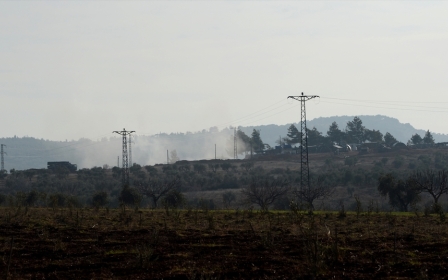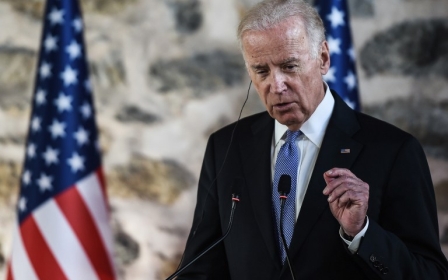Turkey looks to back rebels as Kurds cross 'red line' in Syria

ERBIL, Iraq – Turkey is likely to increase its support for rebel groups in northern Syria after Kurdish forces crossed a “red line” by taking advantage of Russian air strikes to claim territory, analysts say.
The Turkish army began shelling Kurdish positions near the town of Azaz in northern Aleppo province on Saturday in response to an advance by the Kurdish People’s Protection Units (YPG) that saw them claim territory including the Menagh military air base from rival rebels.
The escalation of the conflict in northern Syria, where an offensive by pro-government forces backed by Russian air strikes around the city of Aleppo has already forced tens of thousands of people to flee towards the Turkish border, has caused international alarm, with the US leading calls for Turkey to halt its bombardment.
But analysts told Middle East Eye that Turkey would not allow the Kurds to create a united Kurdish administration on its border and had decided to use artillery strikes to prevent the YPG from gaining further ground.
“Azaz is clearly a red line for Turkey and they will take steps to defend it from groups they deem hostile,” Aaron Stein, a Turkey analyst at the Washington-based Atlantic Council, told Middle East Eye.
Saban Kardas, director of the Ankara-based ORSAM strategy think tank, said that Ankara was also likely to be considering increasing its support for rebel groups opposed to Syrian President Bashar al-Assad but fighting the YPG for territory.
“Hitting [the Kurds with artillery] will not bear any results unless you field another friendly force [on the ground],” Kardas told MEE.
“It would be hard to stage a military incursion or something like that at this stage, but depending on the specifics Turkey may increase assistance to the armed groups in Azaz.”
Kurdish forces captured the Menegh air base from rebel groups on 10 February, after the Syrian government had managed to break through rebel lines on 3 February and break the stranglehold around the mostly Shia towns of Nubl and Zahra.
They then took advantage of the heavy Russian air strikes and the weakness of the Syrian rebel groups to advance further in the direction of Azaz, a key town on the rebel supply route from the Turkish border to the rebel-held east of Aleppo city.
“The YPG has been attacking the rebels in northern Aleppo since Turkey shot down the Russian plane [in November],” Abdurahman Harkoush, a former spokesperson for Jaish al-Islam, told MEE.
“Since the regime reached the Nubl and Zahra area, the regime and the YPG have launched multi-pronged coordinated attacks on northern Aleppo under the cover of Russian air force air strikes. The rebels are Turkey’s friends, and if defeated the YPG will take over all northern Syria.”
Kurds 'support Russian air strikes'
But the Kurds say they are fighting Islamic militant groups such as the Nusra Front.
“We are not with the Syrian regime, but we support Russian air strikes on terrorist groups,” said Sherzad Yazidi, a representative of the Syrian Kurdish administration based in Suleymaniyah.
“Turkey is trying to weaken the Kurds, but that is not going to happen,” he added, also accusing the Turkish government of supporting the Islamic State (IS) group, which Kurdish forces are fighting elsewhere in Syria.
Nusra sources say the group had withdrawn from the countryside of Aleppo in August 2015, after Turkey announced a safe zone plan as part of efforts to coordinate the international fight against IS, which is being attacked by a US-led coalition that includes Turkey.
“They [the Kurds] and Russia claim they only fight al-Qaeda and IS, but there is no proof yet,” said Abu Saeed al-Halabi, a Nusra fighter, who said the group had withdrawn from the Menagh base before it had been occupied by the YPG.
“We are not ashamed to defend ourselves against the YPG, and if Nusra had a presence there we would have published pictures and videos,” he added.
Halabi said he doubted that Turkey would allow the YPG to advance much further.
“It is possible the YPG will take more small villages, but it will be very difficult for almost impossible for them to take Tall Rifat and Azaz,” he added.
However, the Kurds say they are optimistic they will unite their three canton administrations in Kobane, Efrin and in the Hasakah province.
“We are working for this now,” said Yazidi, the Kurdish official.
The ultimate goal of the Kurds is to create a contiguous territory along the Turkish border by capturing the Azaz-Jarabulus border strip.
But Ankara opposes this, and draws no distinction between the YPG and its political wing, the Syrian Kurdish Democratic Union Party (PYD), and the Kurdistan Workers' Party (PKK), which has waged a decades-long separatist insurgency against the Turkish state.
“The PKK knows the importance of its role in the ongoing conflict between Turkey and Russia, and is using it to build a good relationship with Russia in Syria,” said Rodi Hesen, a media analyst for the monitoring website Insightkurdistan.
'Democracy and decentralisation'
Ankara has been conducting operations against militants in Kurdish towns in the southeast of Turkey since the breakdown of the ceasefire with the PKK last summer.
“The Turkish government does not want the Kurds of eastern Turkey to get any ideas about their own federal arrangement,” said Nicholas A Heras, a Washington-based Middle East researcher at the Center for a New American Security (CNAS).
“The Turks also fear that the United States is actively working against Turkish proxies in Syria, which are the militant Islamist rebels,” he added.
The Kurds say they are willing to work with both Russia and the US in the fight against groups such Nusra, Ahrar al-Sham, and IS.
But Turkey has called on the US to distance itself from the Kurds due to their links to the PKK.
“As a principle, the Democratic Self-Administration does not mind reaching any agreement with anyone, including Russia and Assad, to fight Daesh [IS]. Daesh is controlling the areas that could connect the Kobane canton to the Efrin canton,” Naser Hajji Mansour, a Kurdish defence official in Qamishli, Syria, told MEE.
But the Syrian Kurds say they do not want Russia to keep the Syrian government in power, suggesting they want a federal and democratic Syria.
“We do not accept that the fight against Daesh is used to bring back the Assad regime,” said Mansour. “We are part of the coalition against IS, we do not need cooperation with Russia if they try to support the Assad regime.”
Nevertheless, Mansour said the Kurds were ready to accept Russian weapons.
“We are ready to take weapons [from Russia] in an agreement that guarantees democracy and decentralisation,” he said.
“Right now, we cooperate with Russia near Efrin to stop the gangs [Syrian anti-Assad rebels], but that does not mean we cooperate with Assad. The area between Kobane and Efrin are historically Kurdish and we will liberate it sooner or later,” said Gharib Hassou, who represents the Syrian Kurdish Democratic Union Party (PYD) in Iraq's semi-autonomous Kurdish region.
Although Turkey and Syrian rebel groups accuse the Kurds of working with Assad, the PYD denies this.
“We have our national rights that need to be recognised, and Assad is not ready for that. That’s why cooperating with Assad is not in our goals,” he said.
“We are struggling for a democratic model and that is against the dictatorial nature of the regime,” he told MEE.
US officials meanwhile are reported to be unhappy at the closer relationship being forged between the Kurds and Russia, with the Kurdish administration recently opening an office in Moscow.
“The YPG has a mechanism to call in Russian airstrikes. It most certainly complicates the relationship with the United States, but it also gives the YPG leverage. If the US pulls support, they could simply deepen their cooperation with Moscow,” said Stein.
US President Barack Obama’s envoy to the US-led anti-IS coalition Brett McGurk visited Kobani in late January, after Turkey managed to exclude the PYD from this month's peace talks in Geneva.
“We will continue to work with the United States, our relations with the US are good," said Mansour.
"And as you know, Obama’s representatives visited Rojava and met with our political and military leaders. There were a lot of promises from the US to help Rojava.”
Stay informed with MEE's newsletters
Sign up to get the latest alerts, insights and analysis, starting with Turkey Unpacked
Middle East Eye delivers independent and unrivalled coverage and analysis of the Middle East, North Africa and beyond. To learn more about republishing this content and the associated fees, please fill out this form. More about MEE can be found here.




